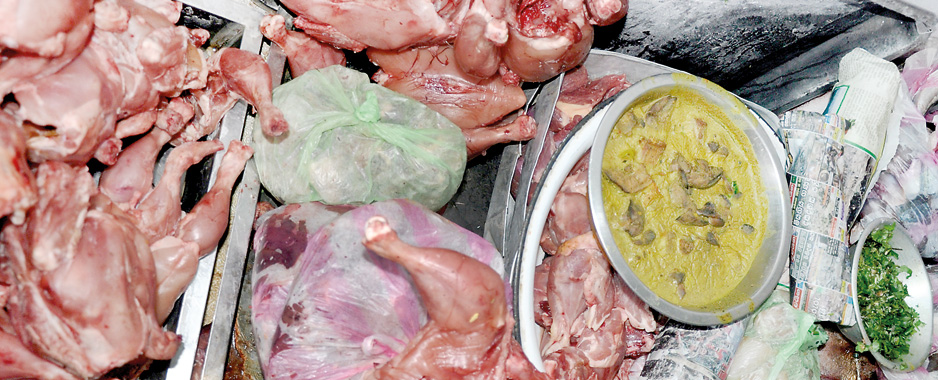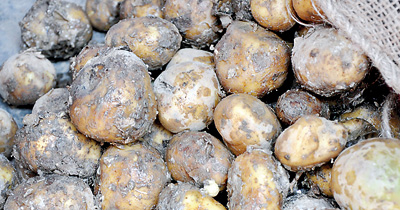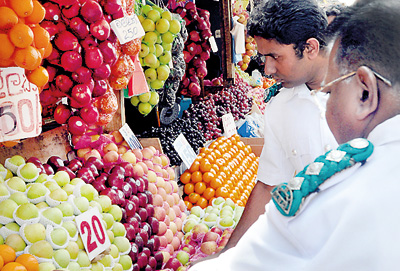News
The food that we eat!
View(s):The Sunday Times joins Public Health Inspectors on an inspection tour of eateries and warehouses in Pettah and Fort.
Mirudhula Thambiah reports
Raw meat and cooked foods stored together in the same freezer shelf, curries that had been cooked sometime back being stored for reuse and large utensils containing exposed food, placed on the floor. These were some of the unhygienic scenes that greeted Public Health Inspectors (PHIs) who carried out raids on some food outlets in Pettah and Fort on Thursday.

Dr. Pradeep Kariyawasam
A team from the Sunday Times also accompanied the CMC officers who checked on eateries and vegetable and fruit warehouses. Although the PHIs claimed that the conditions at these places had improved because of frequent raids and warnings to eatery owners and food handlers, the Sunday Times saw scenes to the contrary.
When questioned some of the cooks admitted that food cooked in the mornings were sometimes sold in the evening too. This is despite a CMC order that cooked food should be disposed of within four hours after preparation.
The PHIs who tested some of the curries and chutneys at an eatery ordered that they be thrown away as they were stale. They also advised food handlers to store the meat, vegetables and milk products in different freezers to prevent germ contact.
We witnessed at the same eatery, chopped up vegetables laid out on the grimy floor while the coconut scrapers were coated in residue and were rusted too.M.B Lal Kumara, Food Inspector for Colombo Central assured that legal action would be taken against the eateries tomorrow, following the release of the results on the food samples.
In one warehouse in Pettah, on seeing a large number of rotten potatoes in gunnies the PHIs told the Sunday Times that the owner would be taken to court. However, the potato store keeper claimed that the rotten potatoes were put in gunny bags to be disposed of and were awaiting CMC garbage collectors.
The PHIs also collected samples of dry fish, red chillies and red rice to test mainly whether they were contaminated with dye. Mr. Kumara said on Wednesday raids were conducted on more than 60 food stalls on Galle Face Green and food samples from about 10 stalls had been sent for laboratory tests.
“There were stalls selling coloured food items which we felt could be contaminated with fabric dyes,” he said. Meanwhile, CMC’s Chief Medical Officer Dr. Pradeep Kariyawasam said many food sellers cooked in bulk and the excess food was sometimes stored even up to five days. The food is reheated and sold to the unsuspecting consumers.

Ideal breeding ground for germs: PHIs raid a eatery where raw meat, cooked food and vegetables were all dumped together in the freezer
In a move to stop this practice that posed health risks he said they conducted raids at night. The culprits were mainly kottu stalls and other wayside eateries.
He also said the Municipality has advised eateries to have an open kitchen system. This way the consumers could see how the food is being prepared and the owners could prepare the food only when ordered instead of cooking in excess.
“Most eateries do not wash the eggs before they are used for cooking. During one raid we found eggs covered in excreta. If you do not wash the eggs, the excreta could get into the food that is being prepared, contaminating it,” he said.
Dr. Kariyawasam added that two tonnes of dried fish and 500 kg of pepper were destroyed in December as they were contaminated. Commenting on the new food hygienic regulation he said about 400 eateries have been registered and legal action has been filed against those that have not been registered.
Giving a note of advice to consumers Dr. Kariyawasam said people should be particularly careful about that glass of water they drink and sea food preparations. He said if the rice was dry that would mean it had been reheated. He also said dhal curry, a favourtie among many consumers was one dish that was heated several times a day.
 Rotting potatoes at a warehouse |
 How fresh are these fruits? PHIs do their bit |
“People are not used to hygienic cooking practices in our country.
In village areas the kitchens are mostly situated in the backyard and most of the cooks in city wayside eateries are from village areas.
Therefore they practise the same methods here too. They do not wash their hands or even trim their nails,” he added.
Dr. Kariywasam also noted that there should be an upward revision of fines, if they are to act as a deterrent. Under the CMC Food Act, the fines range from Rs.1000 to Rs.5000 and it could carry a prison sentence too.
He believes that the fines should start at Rs. 5,000 and go upto Rs.50,000 while a licence should be cancelled if an offence was repeated.
Meanwhile, commenting on the recent increase in food contamination and food poisoning cases, Sri Lanka Medical Reasearch Institute’s Food and Water Department head Dr. Siddhartha Pathirage said many food handlers who prepare food had little knowledge about hygienic practices and they should be made aware of the laws and regulations regarding health and the importance of protecting the consumers from food related diseases.
The microbiologist also said since eating out has become a popular activity, consumers should be careful about the places they patronise.
According to CMC, 517 prosecutions, 288 convictions and Rs.312,000 have been collected as fines under the food Act for last year.
Follow @timesonlinelk
comments powered by Disqus















